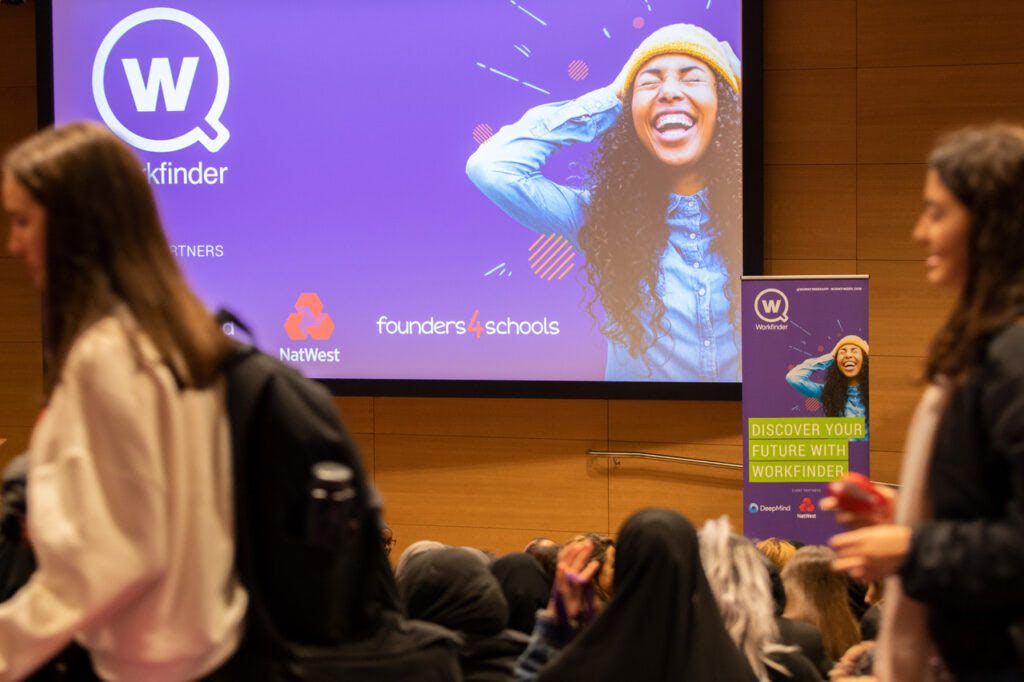Workfinder connects almost 200 young women with STEM work experience on Ada Lovelace Day

Female sixth form students inspired to explore science and tech careers by leading women at RBS, DeepMind, Snap Inc, Microsoft and more
Today marks Ada Lovelace Day 2019, an international celebration of the achievements of women in science, technology, engineering and maths (STEM) careers. Founded in 2009, it is now held every year on the second Tuesday of October to increase the profile of women in STEM, in memory of the first computer programmer, Ada Lovelace. The day was set up ten years ago aims to increase the profile of women in STEM and, in doing so, create new role models who will encourage more girls into STEM careers and support women already working in STEM.
Workfinder, the platform built to inspire the next generation and create a pipeline of talent to drive the UK’s most ambitious growth companies, is today hosting an event at the Francis Crick Institute for 186 female sixth form students in celebration of Ada Lovelace Day.
In keeping with what the day stands for, a diverse line-up of female role models in STEM, including CEO of Commercial and Private Banking RBS, Alison Rose, DeepMind COO Lila Ibrahim, Girlguiding advocate Juliet Dowley, Snap Inc VP Claire Valoti, Microsoft for Startups UK MD Amali de Alwis, Francis Crick Institute mathematician Esther Wershof and techUK president Jacqueline de Rojas, will deliver a series of inspirational TED-style talks that aim to bring their experiences to life for attendees.
Far from being just another inspirational event, a number of companies – including RBS, Made.com, PayPal, Eurostar and more – will take part in a speed networking session after the talks and, alongside 35 other UK companies, will also be offering the girls valuable work experience placements during the October half term (21 – 25 October).
Sherry Coutu CBE, founder of Workfinder, commented: “With 80 percent of experts saying they would hire a B-grade student with a relevant internship over an A+ student without any, and with 90% of employers saying that they need talent with the right skills more than anything else, including funding, we know work experience to be the critical bridge between education and employment.
That is why we have worked with employers for the past three years to create Workfinder so it was super simple for work experience hosts from the UK’s best businesses to hire fresh talent in a few clicks for a fraction of the time and money it might otherwise take. This helps the company on critical projects, learning & development of their millennial staff and young people to acquire critical skill sets that they will need when they are ready for their first permanent role.”
Alison Rose, CEO of Commercial and Private Banking, RBS, said: “It is incredibly encouraging that events like these are empowering young female talent on their educational and professional journeys. If we are to help the next generation of women into the leadership roles of the future, we must continue to support and equip them to overcome the barriers they currently face. I am proud to be here, celebrating women and girls in STEM.”
Lila Ibrahim, COO of DeepMind, also commented: “The potential of advanced AI to contribute positively to our world, addressing some of the biggest problems we face, such as disease and climate change, is huge. But, AI can only make a positive impact if it reflects a diversity of backgrounds and needs.
“Inspiring the next generation of scientists to consider careers in STEM (science, technology, engineering and maths) is critical if we are to ensure that the new technologies we build are truly representative of who we’re building them for.”
With this in mind, please see comment below from Dominic Harvey, Director at leading tech jobs board, CWJobs, on the importance of promoting role models to support the current female workforce, as well as inspire and encourage the next generation of female talent into STEM careers.
Dominic Harvey, Director at CWJobs, said:
“Recognising one of the leading icon’s for women in STEM through Ada Lovelace Day is a key moment in the international calendar for the industry. It is extremely important to address the gender imbalance in the sector, which currently favours men, and celebrate prominent female figures, in order to encourage and retain female talent. Bringing more women into the industry not only helps to meet demand, with every company now looking for tech skills, but will strengthen the industry with different ideas and viewpoints.
“Our research found that 64% of women in tech claim to have been motivated by an inspirational figure to pursue their career – compared with just 47% of men. However, despite a role model being crucial to attracting female talent, worryingly UK workers in STEM are at a loss when it comes to naming key role models in their industry, showing the work still to be done.
“Positively promoting women who have worked their way up the ladder and carved successful careers within the industry is just the start of normalising the core value of women and the significant impact they have within tech departments and wider businesses throughout the UK.”
Fujitsu is not just working on encouraging more women to work in the world of tech, but also creating an environment where women are part of an engaged, healthy team capable of thinking and acting to tackle today’s technology challenges. Karen Thomson, Diversity and Inclusion Lead at Fujitsu UK & Ireland, said:
“Although Ada Lovelace day signals how much better we have become at making female role models more visible, there’s still much more that needs to be addressed. The first being an undeniable need to attract more female talent into STEM roles. Despite technology becoming more infused into everything that we do, there is still a flawed perception that women do not belong in STEM professions. However, if we’re to secure the UK’s position in a digital future, promoting more diversity in STEM roles is absolutely crucial.
“This is not just an organisational challenge, but a societal one too – of which both public and private organisations should join forces to address. For one, businesses and schools should be telling the stories of some of the great female tech trailblazers, like Ada Lovelace, in a bid to inspire young girls and women to follow in their footsteps. Ultimately, the future does look bright for women in the UK, but only with continued support from the government and organisations and by squashing perceptions that do not belong in a modern-era, can we ensure more diversity in STEM roles across the nation.”
If you work at a high-growth organisation that hasn’t already considered the impact opening your company’s doors to tomorrow’s talent could make, please visit Workfinder to find out more.











Responses